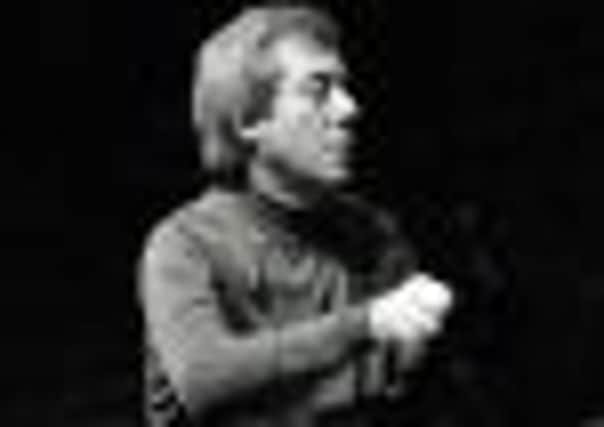With Tchaikovsky, Shostakovich and Prokofiev set for Edinburgh, pianist Dmitri Alexeev explains why he’s particularly looking forward to it


The pianist is Dmitri Alexeev. He will play one of the most popular warhorses in the Russian virtuoso repertoire, Tchaikovsky’s Piano Concerto No 1, in collaboration with conductor Yuri Temirkanov, who has shaped a generation of highly personalised performances with his St Petersburg players ever since taking over the reins of Russia’s oldest orchestra in 1988, and who will also conduct Prokofiev’s elegant Classical Symphony and Shostakovich’s gloriously ambiguous Fifth.
“I don’t consider the Tchaikovsky to be a warhorse,” Alexeev says, despite admitting to a point in his early career when he did in fact cast it aside. “I did get kind of tired of it 30 years ago, but that was more to do with me as a young pianist. Nowadays I see it with completely new eyes. For me it is as fresh as the day it was written. It’s not so much a warhorse as a truly great Romantic piece – as Romantic as a Rachmaninov symphony or Tchaikovsky’s Romeo and Juliet.”
Advertisement
Hide AdAdvertisement
Hide AdAnd very Russian too, he quickly adds. “Those folk melodies, those big Tchaikovsky tunes are Russian to the core.”
It’s tempting to put Alexeev’s effusive enthusiasm down to homesickness. After all, the Moscow-born pianist, soon to turn 65, has been London-based ever since the collapse of the Soviet Union, before which he was – like so many other Moscow-based artists – dependent on the bureaucratic whims of the Soviet authorities to let him come and go, or not, as his worldwide career expanded in the late 1970s and early 80s.
It was a dilemma that almost put a dampener on perhaps the most important turning point in his early career – when in 1975, as outright winner of the Leeds International Piano Competition against an Olympic standard runners-up list that included Mitsucho Uschida, Andras Schiff and Myung-wha Chung, he discovered there might be problems fulfilling the recital obligations.
“It was such an important competition to win, but the only thing I remember was being concerned about all the concert engagements that went with it. Getting in and out of the Soviet Union was not as smooth a process as it could have been, so I was going to be very dependent on people getting me out.”
“Fortunately that’s all in the past,” he says. London has been his home since 1990, mostly as it provides the ideal base for his musical globetrotting. But with frequent trips back to Russia “for family as well as musical reasons”, and the recently added commitment of a piano professorship at the Royal College of Music in London, he now spreads his life evenly between Russia and the West. “I’ve never considered myself an émigré,” he adds.
Which is why he relishes any opportunity to perform the Tchaikovsky with musicians from his homeland. And if they happen to be the St Petersburg Philharmonic – with whom he has a special relationship and for whom he holds the fondest affections – then Alexeev is in seventh heaven.
“I have played with this orchestra many times over the past 40 years, much of that with Temirkanov, and very often playing the Tchaikovsky,” he says. “We have a good relationship. They are a marvellous orchestra with a very special sound.”
Advertisement
Hide AdAdvertisement
Hide AdThat last point is particularly interesting, given the extent to which some East European Orchestras have in recent years allowed their formerly distinctive styles of playing – succulent well-honed string section offset by highly characterised wind and brass tone – to dissolve into a sort of amorphous globalised sameness.
“Not the St Petersburg,” Alexeev insists. “They are the oldest orchestra in Russia, and back in the late 19th century they were also the imperial orchestra, so they have a long tradition and a very special sound that is mellow, smooth and noble and which has never disappeared. I played with them last night and I was so happy to hear that this original quality has been preserved.”
It’s a tradition that Temirkanov has worked hard to maintain, particularly in repertoire that courses through all their veins. They were, after all, the orchestra that premiered many of Shostakovich’s symphonies, and Temirkanov himself learned his trade as assistant to the legendary Yevgeny Mravinsky, before succeeding him in 1988 as musical director of the orchestra known then, in Soviet times, as the Leningrad Philharmonic.
Tonight’s concert features the Fifth Symphony, which Mravinsky famously premiered and which was cryptically referred to – though not directly by the composer – as “a Soviet artist’s reply to just criticism”, following castigation in the state-controlled newspaper Pravda of Shostakovich’s earlier music, particularly the opera Lady Macbeth of Mtensk.
It was this same orchestra, too, that premiered Prokofiev’s Classical Symphony in 1917, also featuring in tonight’s programme; and there’s every chance they would have given the Russian premiere of the Tchaikovsky, had they actually been in existence when that event took place in St Petersburg in 1875. That was seven years before the city’s famous orchestra was established in 1882.
Alexeev, despite his Moscow credentials, is delighted yet again to be a part of this travelling St Petersburg circus, particularly with Temirkanov as the ringmaster.
“As a musician he has a very personal view of the music – he is very Romantic, very active, and the music he creates is very flexible, very alive and very bright,” says the pianist. “He exudes all that is good about Russian musicians and the very best of Russian musical tradition.”
I just hope the Usher Hall’s bar is stocked up with vodka.
• Dmitri Alexeev appears with the St Petersburg Philharmonic, under Yuri Temirkanov, at the Usher Hall, Edinburgh, tonight.